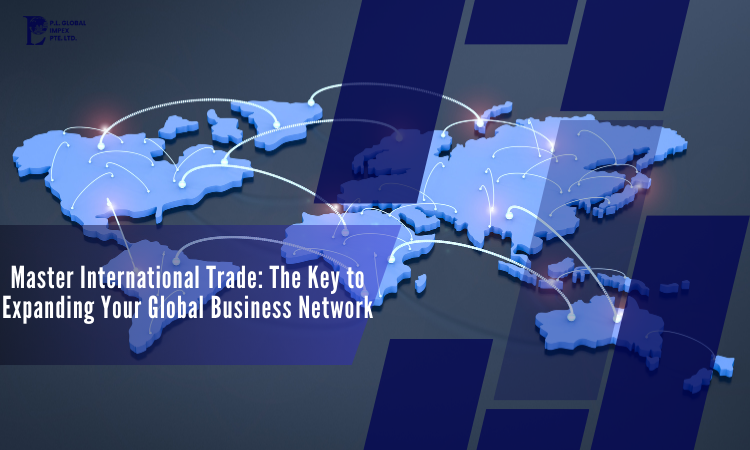Table of Contents
Introduction:
Welcome to our blog, where we delve into the exciting world of international trade and business. With a focus on helping you master the intricacies of global commerce, we offer valuable insights, tips, and strategies to navigate the ever-changing landscape. Whether you’re interested in international trading, international trade consulting, or exploring new opportunities in the international trade business, we’ve got you covered. Let’s embark on this journey together and unlock unlimited global business potential.

Master International Trade: The Key to Expanding Your Global Business Network
- Access to new markets: By understanding international trade regulations, you gain access to a vast array of new markets across the globe. This enables you to diversify your customer base and tap into regions with high demand for your products or services. Unlocking new markets not only boosts revenue potential but also reduces reliance on a single market, minimizing risks associated with economic fluctuations and local market conditions.
- Increased profitability: International trade often presents opportunities to source materials or products at a lower cost from international suppliers. By optimizing your supply chain and exploring favorable trade agreements, you can achieve cost savings, which directly impacts your profitability. Additionally, expanding your market reach opens up avenues for economies of scale, further enhancing your bottom line.
- Knowledge exchange and innovation: Engaging in international trade exposes your business to new ideas, technologies, and business practices from different cultures and industries. This exchange of knowledge fosters innovation and allows you to adapt and grow in an increasingly competitive global marketplace.
- Strategic partnerships: Mastering international trade helps you establish valuable connections with suppliers, distributors, and business partners worldwide. Collaborating with international players can provide access to local expertise, resources, and distribution networks, enabling you to navigate foreign markets more effectively. These strategic partnerships can be crucial for sustained growth and market penetration.
- International trade consulting: To fully harness the benefits of international trade, businesses often seek guidance from international trade consultants or experts. These professionals possess in-depth knowledge of trade regulations, market dynamics, and potential risks, assisting you in making informed decisions and mitigating challenges along your international expansion journey.

How to Navigate the World of International Trading: A Guide for Entrepreneurs
Are you an entrepreneur looking to expand your horizons and tap into global markets? Welcome to the world of international trade, where great opportunities await those who are willing to navigate its complexities. As an entrepreneur, mastering international trade can be a game-changer for your business, opening up a world of potential customers and lucrative partnerships. In this guide, we will provide you with valuable insights and tips on how to navigate the world of international trading.
- Conduct Market Research: Understanding the dynamics and demands of different markets is crucial for successful international trade. Start by identifying countries or regions where your product or service has potential demand. Analyze market trends, competition, local regulations, and cultural differences. Consider seeking international trade consulting to gain expert insights and guidance.
- Develop a Solid International Trade Strategy: A well-defined strategy is essential for navigating international markets. Determine your business objectives, target markets, pricing strategies, distribution channels, and legal considerations. Take into account factors such as transportation, tariffs, customs regulations, and payment methods. Be adaptable and open-minded throughout the process.
- Build Strong Relationships: Trust and strong relationships are key to thriving in international trade. Attend trade shows, join industry associations, and network with professionals in your target markets. Engage in open and transparent communication, respect cultural differences, and invest time in building relationships with local distributors, agents, and partners.
- Understand the Legal and Regulatory Landscape: International trade involves numerous legal and regulatory considerations. Stay up-to-date with import/export laws, trade agreements, intellectual property rights, and customs procedures. Engage the services of legal professionals or seek assistance from international trade organizations to ensure compliance with all applicable rules and regulations.
- Stay Informed and Seek Guidance: The world of international trade is constantly evolving, with new opportunities and challenges arising regularly. Stay informed about global trends, economic indicators, and political developments. Continuously educate yourself through industry publications, webinars, and workshops. Consider partnering with experienced professionals who can guide you through the complexities of international trade.
Embarking on international trade may seem daunting, but with the right strategy and resources, it can catapult your business to new heights. By conducting thorough market research, developing a solid strategy, building relationships, understanding legal considerations, and staying informed, you can master the world of international trade and unlock a world of opportunities for your business.

Unlocking Profitable Opportunities: Strategies to Succeed in International Trade
In today’s interconnected world, engaging in international trade offers businesses a multitude of opportunities for growth and profitability. However, navigating the complexities of global markets requires a strategic approach and a deep understanding of the international trade landscape. Here, we present some key strategies to help you succeed in international trade.
- Conduct Thorough Market Research: Before venturing into international trade, it is crucial to thoroughly research potential target markets. This includes analyzing market size, consumer preferences, competition, and regulatory frameworks. By gaining profound insights into your target market, you can tailor your products and services to suit the local demands and gain a competitive edge.
- Develop Strong Relationships: Building relationships is vital in international trade. Cultivating strong networks with local distributors, suppliers, and industry associations can open doors to new business opportunities and provide valuable market intelligence. Attending industry trade shows, participating in international conferences, and engaging in international trade associations can help you establish meaningful relationships that can pave the way for success.
- Adapt to Cultural Differences: Culture plays a significant role in international trade. Businesses that understand and respect local customs, traditions, and etiquettes have a higher chance of building trust and credibility with international partners. Adapting marketing strategies, product packaging, and communication styles to suit local preferences can enhance your brand’s appeal and increase your chances of success.
- Leverage Technology: In the age of digitalization, technology has become a game-changer in international trade. Utilize online platforms and e-commerce solutions to reach a wider audience, streamline operations, and reduce transaction costs. Embracing emerging technologies like blockchain, artificial intelligence, and big data analytics can provide valuable insights, enhance supply chain efficiency, and reduce risks associated with international trade.
- Seek Professional Guidance: International trade consulting firms can offer invaluable guidance and expertise in navigating the complexities of global markets. These professionals can help with market entry strategies, regulatory compliance, risk assessment, and supply chain optimization. Their experience and domain knowledge can provide you with a competitive advantage and increase your chances of success.
By adopting these strategies, businesses can unlock profitable opportunities in international trade. With careful planning, market research, and a commitment to building strong relationships, you can position your business for success in the global marketplace. Remember, international trade is a journey, and by continuously adapting and learning, you can stay ahead of the curve and reap the benefits of expanding into new markets.

The Benefits of Hiring an International Trade Consulting Firm
Expertise in International Trading:
International trade consulting firms specialize in assisting businesses with their global trade endeavors. With their in-depth knowledge of international markets, regulations, and trade agreements, they can help businesses develop effective strategies to optimize their trading operations. These experts are familiar with the complexities of customs compliance, documentation requirements, and international shipping logistics, enabling businesses to overcome potential obstacles and minimize risks.
Access to Global Networks:
One of the key advantages of collaborating with an international trade consulting firm is gaining access to an extensive network of contacts in international markets. These firms often have established relationships with key stakeholders, including distributors, suppliers, and government agencies. Leveraging their network, they can help businesses identify potential partners, negotiate favorable contracts, and navigate the cultural nuances of doing business in different regions. This can greatly facilitate market entry and expansion, ultimately leading to enhanced profitability and growth.
Cost and Time Savings:
Managing international trade processes can be time-consuming and resource-intensive. By outsourcing these functions to an international trade consulting firm, businesses can save valuable time and resources. These experts will handle tasks such as market research, product classification, documentation preparation, and trade compliance, allowing business owners and their teams to focus on core operations. Additionally, their expertise and experience can help expedite processes, ensuring quicker order fulfillment and reducing unnecessary delays and expenses.
Mastering International Trade: Essential Skills for Business Growth
In today’s globalized economy, businesses are increasingly embracing international trade as a means to expand their reach and tap into new markets. However, navigating the intricacies of international trade can be a daunting task, requiring a range of essential skills that go beyond traditional business practices. In this blog section, we will explore the fundamental skills necessary for mastering international trade and unlocking the potential for business growth.
Key Skills for Successful International Trading
- Understanding Global Markets:
The first step to mastering international trade is gaining a deep understanding of global markets. This involves comprehensive research and analysis of target markets’ economic, political, and cultural factors that may impact business operations.
- Cross-Cultural Communication:
Effective communication is vital when conducting international trade. Business professionals must learn to adapt their communication styles to suit different cultures, languages, and customs to foster successful relationships and avoid misunderstandings.
- Knowledge of Trade Regulations and Compliance:
Navigating international trade regulations can be complex, with varying laws, tariffs, and restrictions in different jurisdictions. Mastering the knowledge of trade regulations and compliance is crucial to ensuring legal and ethical trade practices.
- Risk Management:
International trade inherently carries risks. Businesses need to develop robust risk management strategies to mitigate potential challenges such as currency fluctuations, political instability, and supply chain disruptions.
- International Trade Consulting:
When navigating the complexities of international trade, seeking guidance from international trade consulting experts can prove invaluable. Professional consultants offer specialized knowledge and experience, providing insights into market entry strategies, trade negotiations, and identifying potential risks.
Breaking Barriers: How to Overcome Challenges in International Trade
In today’s globalized economy, international trade has become a cornerstone of business success. However, engaging in international trade is not without its challenges. From cultural differences to regulatory hurdles, there are numerous barriers that can impede the smooth flow of goods and services across borders. However, these challenges are surmountable with the appropriate approaches and perspective..
One of the most critical factors in mastering international trade is having a deep understanding of the unique dynamics of each market you wish to enter. This includes researching the cultural norms, business practices, and legal requirements of the target country. A well-informed approach enables you to navigate potential pitfalls and build strong relationships with local partners.
Another crucial aspect is seeking the support of international trade consulting experts. These professionals possess the knowledge and experience to guide you through the complexities of international trade, ensuring compliance with regulations and minimizing risks. Their assistance can prove invaluable in identifying potential challenges and devising effective strategies to overcome them.
Maintaining flexibility and adaptability is also paramount in international trade. As markets evolve and circumstances change, being able to quickly adjust your approach can make all the difference. This may involve adapting your product or service to cater to local preferences, finding alternative suppliers, or renegotiating terms with partners. Flexibility allows you to respond proactively to challenges and seize new opportunities as they arise.
Finally, establishing a robust network of contacts and fostering strong relationships is vital in international trade. Networking with individuals who have experience in the target market can provide valuable insights and open doors to new opportunities. Building trust and understanding with local partners is equally important as it establishes a solid foundation for collaboration.
Although international trade presents its fair share of challenges, with the right strategies and mindset, these barriers can be overcome. By mastering the intricacies of the target market, seeking expert advice, staying adaptable, and fostering strong relationships, businesses can unlock the vast opportunities that lie beyond their borders. With determination and perseverance, international trade can be a rewarding endeavor for those willing to break barriers.

Exploring New Markets: International Trade as a Catalyst for Business Expansion
The Value of Mastering International Trade for Business Growth
In today’s interconnected global economy, businesses of all sizes are constantly seeking opportunities to expand their operations beyond domestic borders. International trade has become a powerful catalyst for business growth, opening doors to untapped markets and allowing companies to leverage their expertise and resources on a global scale.
Mastering the complexities of international trade has become crucial for businesses looking to expand and explore new markets. By understanding and effectively navigating the intricacies of cross-border transactions, companies can tap into a wealth of opportunities that would otherwise remain untapped. From importing and exporting goods to setting up overseas distribution networks, international trade offers a multitude of avenues for expansion.
For those new to international trading, seeking guidance from an international trade consulting firm can be immensely beneficial. These experts possess in-depth knowledge and experience in dealing with the challenges and nuances of conducting business across borders. From navigating tariffs and customs regulations to identifying potential trade barriers, international trade consultants provide valuable insights and guidance to help businesses overcome obstacles and maximize their success in new markets.
Furthermore, engaging in international trade offers businesses a chance to diversify their customer base, reduce dependency on domestic markets, and hedge against economic fluctuations. Access to new markets means access to new customers with different preferences, needs, and purchasing power. By adapting their products and services to suit these market dynamics, businesses can strengthen their competitive position and expand their reach.
The Role of Technology in International Trade: Leveraging Digital Solutions for Success
In today’s global marketplace, technology plays a vital role in facilitating and accelerating international trade. From streamlining processes to enhancing communication and expanding market reach, digital solutions have transformed the way businesses engage in cross-border transactions.
One of the key benefits of technology in international trade is the efficient management of complex logistics and supply chains. With the help of digital platforms and software, businesses can automate and optimize their inventory management, shipping, and tracking processes, reducing costs and increasing overall efficiency. This not only enhances the competitiveness of businesses but also improves customer satisfaction by ensuring timely delivery of goods and services.
Moreover, technology has revolutionized communication in international trade. Video conferencing, instant messaging, and collaboration tools enable real-time communication between businesses across different time zones, overcoming geographical barriers and fostering collaboration. This has significantly improved the speed and ease with which businesses can negotiate contracts, resolve disputes, and build mutually beneficial relationships with international partners.
Furthermore, digital solutions offer businesses the ability to expand their market reach beyond their local boundaries. E-commerce platforms, online marketplaces, and digital advertising enable businesses to showcase their products and services to a global audience, attracting and engaging customers from different parts of the world. This provides businesses with unprecedented opportunities for growth and diversification, as they can tap into international markets with relative ease.

International Trade Agreements: Understanding Their Impact on Global Business Opportunities
In today’s interconnected world, international trade has become the lifeblood of global economies. With businesses expanding their operations beyond national borders, it has become crucial to understand the impact of international trade agreements on business opportunities worldwide.
International trade agreements are bilateral or multilateral agreements between countries that aim to promote and facilitate trade by removing barriers and establishing regulations. These agreements govern various aspects of trade, including tariff rates, market access, intellectual property rights, and investment policies.
For businesses, understanding the implications of these agreements is essential for identifying new markets, streamlining supply chains, and maximizing profit margins. By staying updated on the latest trade agreements, businesses can capitalize on opportunities arising from reduced tariffs and preferential access to foreign markets.
One of the most significant benefits of trade agreements is the elimination or reduction of trade barriers such as tariffs and quotas. This fosters a more open and competitive business environment, allowing companies to access larger consumer markets and enjoy a wider range of suppliers. As a result, businesses can source raw materials and components at lower costs, enhancing their competitive advantage.
Moreover, trade agreements provide businesses with a stable and predictable regulatory framework. By adhering to established trade rules and standards, companies can mitigate risks associated with fluctuating policies, enhancing their ability to plan and invest in new markets.
However, it is essential to note that trade agreements can also pose challenges for businesses. They may require companies to comply with specific regulations and standards, which can increase operational costs and necessitate adjustments to business processes. Additionally, competition from foreign businesses may intensify as markets open up, requiring businesses to adapt and innovate to stay ahead.
From Local to Global: Steps to Establish a Successful International Trade Business
Mastering International Trade
In today’s interconnected world, mastering the art of international trade is key to expanding your business and reaching global markets. Whether you are a small-to-medium-sized enterprise or a large corporation, taking your business from local to global can be a challenging but rewarding endeavor. In this blog section, we will discuss the essential steps to establish a successful international trade business, helping you navigate the complexities of the global marketplace.
International Trading: Breaking Barriers, Embracing Opportunities
International trading offers immense potential to businesses looking to expand their horizons. Breaking barriers, such as language, cultural differences, and legal frameworks, is vital in overcoming challenges for successful trade across borders. Partnering with international trade consulting firms that specialize in market research, regulatory compliance, and logistics can help you reduce risks and enhance your global trade strategy. These experts can guide you through the intricate processes, enabling you to tap into new markets with confidence.
Expanding Beyond Borders: Building a Solid Global Network
Building a strong and extensive network is crucial when entering international trade. Cultivating relationships with reliable suppliers, international distributors, and trusted agents will help you establish a presence in global markets. Attending trade shows, conferences, and industry events can provide valuable networking opportunities, allowing you to connect with potential partners and gain insights into the international market dynamics. Additionally, leveraging digital platforms and social media can help you showcase your products or services to a wider audience, further expanding your reach.
Navigating Regulatory Landscapes: Compliance is Key
Understanding and adhering to international trade regulations is essential to avoid legal issues and maintain a positive reputation in the global arena. Familiarize yourself with international trade laws, customs procedures, and trade barriers specific to your target markets. Partnering with international trade consultants with in-depth knowledge of local regulations can streamline the compliance process, mitigating potential risks and ensuring smooth operations.
Strategic Planning for Success
Developing a comprehensive international trade business plan is crucial for long-term success. Identify your target markets, assess their demand for your products or services, and evaluate local competition. Set realistic goals and establish measurable milestones to track your progress. Conduct thorough market research to understand consumer preferences, local trends, and pricing dynamics. Effective strategic planning will not only guide your international expansion but also assist in resource allocation, budgeting, and risk management.
Conclusion:
Pursuing a Master’s degree in international trade is the key to unlocking endless global business opportunities. With specialized knowledge in international trading and access to international trade consulting services, professionals can navigate the complexities of international trade and successfully expand their business on a global scale. Don’t miss out on the chance to become a master in international trade and reap the benefits of a thriving international trade business.



